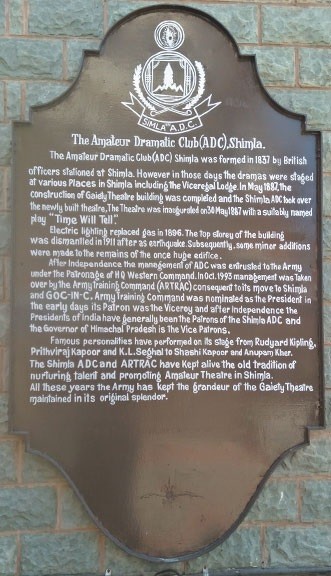HISTORY : THE SHIMLA AMATEUR DRAMATIC CLUB
 The history of Amateur Theatre in Shimla began with the coming of European invalids and the town’s growth as the ‘Summer Capital’ of British India. As theatre evolved in town, it served not only as an elegant pastime but also became a social necessity of sorts – and often enough, participation was treated as a significant career move.
The history of Amateur Theatre in Shimla began with the coming of European invalids and the town’s growth as the ‘Summer Capital’ of British India. As theatre evolved in town, it served not only as an elegant pastime but also became a social necessity of sorts – and often enough, participation was treated as a significant career move.
The first recorded amateur dramatic performance was held on 09 June 1838. Emily Eden, sister of the Governor-General, Lord Auckland wrote, “We went to the play last night. There is a sort of little theatre at Simla, small and hot, and somewhat dirty, but it does very well.” These performances were held at the old Royal Hotel (later, Lawrie’s Hotel) that stood at the site of the present Ladies’ Park.
As a body, the Shimla Amateur Dramatic Club (ADC) was formally housed in the Gaiety Theatre in 1887 and registered as a joint-stock company. The first performance was of the aptly named play, ‘Time Will Tell’. The Club steadily developed as an institution that promoted theatre and as a place of socialising for British military and Civil officers and a select number of Indians and other Europeans. Soon after the Independence of India, the ADC went into a partial decline and there was a possibility of this historic club closing down. At that time, the reorganised Western Command of the Indian Army was stationed in Shimla and some members of the ADC approached the Command to step in; subsequently, the Club came under the Western Command’s aegis and the roll of membership comprised of officers from the armed forces as well as civilians. The ADC then came under the charge of Punjab, Haryana and Himachal Pradesh Area, which arrived in Shimla after the Western Command moved to Chandimandir in 1985. When the Army Training Command (ARTRAC) shifted to Shimla from Mhow in 1993, the ADC came under its wings.
The original objectives of the Club were to protect the rights of playwrights, to let out plays to other societies as well as produce plays locally. Plays were often purchased in England and at times, authors sent these directly to the Club. Most of those staged were drawing-room comedies along with an occasional musical. Boxes were normally let out for the ‘season’ and the Club committee tried to assure at least six plays a year. Several Indian theatre groups also used the hall and stage. In the pre-Independence years, the Club’s patron was the Viceroy and its list of members read like a who’s who of the British-Indian society. In the post-Independence years, various Presidents of India have been Patrons and several Governors of Himachal Pradesh have been the Vice-Patrons.
Those who have acted on the Gaiety’s stage include the celebrated writer, Rudyard Kipling, founder of the Boy Scout Movement, R Baden-Powell, the renowned artist, Amrita Shergill and actors, the Kendalls. The great singer, K L Saigal is regarded to have given his first public performance here. Several well known names have been connected with the Gaiety Theatre and include Bisham Sahni, Prithviraj Kapoor, Vera Sundar Singh, Amrita Shergill, Ramesh and Sudarshan Gaur, Manohar Singh and Anupam Kher.
The large and imposing building which, among other premises, housed the ADC was the old Town Hall that was completed on 30 May 1887. It then had a basement and four floors above ground level. Gothic in style, the structure completely dominated Shimla's skyline and southern slopes. Major defects in the building were noticed soon after its completion. For safety, in 1911, the upper portions of the building were dismantled. Subsequently, some minor additions were made to the remains of this once huge edifice. Towards the end of the last millennium, an extensive restoration in the ‘Gothic revival’ style sought to restore the structure’s former glory and modify the usage of its spaces. As a result of this, on 23 December 2006, the premises of the ADC were relocated to the current located within the precinct.
Today, the GOC-in-C, ARTRAC is the Club’s President and the ADC is one of North India’s most prestigious Clubs; its membership has armed and civil officers as well as other leading citizens. Apart from numerous other activities, following a long tradition, the Club continues to promote Amateur Theatre.